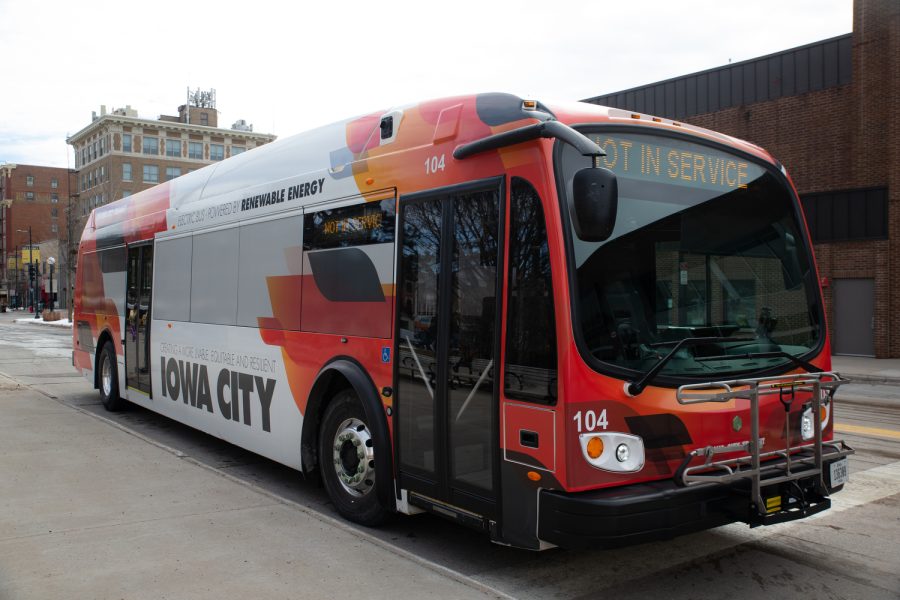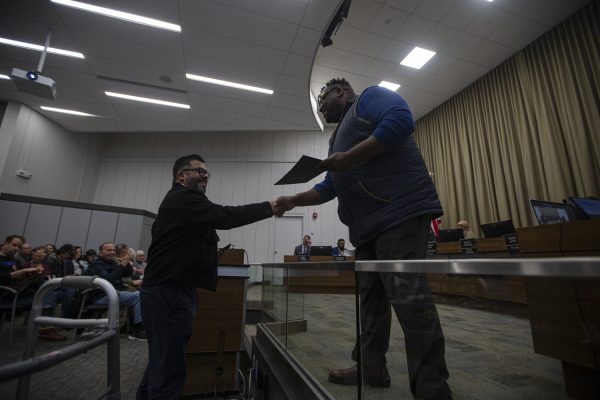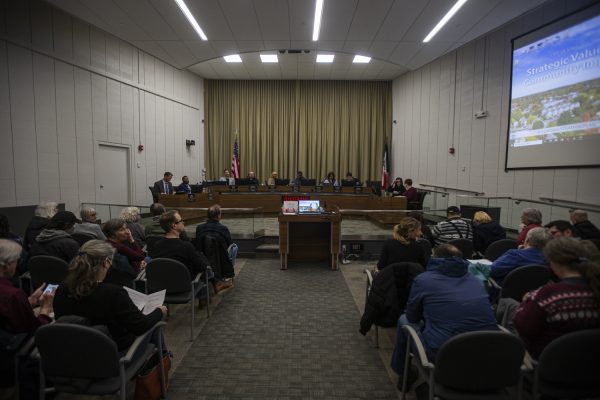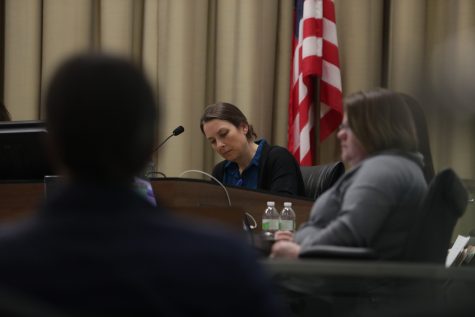Iowa City plans to have a fully electric bus fleet in the future
The city is looking at applying for grants to buy more electric buses and update its transit facilities to accommodate this transition.
A Proterra ZX5 electric bus operated by Iowa City Transit is seen at a downtown interchange in Iowa City on Feb. 21, 2023.
February 21, 2023
The City of Iowa City is working to create a more clean and sustainable public transit system by transitioning all city-owned buses to electric or low-emission vehicles.
City of Iowa City’s Transportation Director Darian Nagle-Gamm said the city has four electric buses out of its 27-bus fleet. The city still plans to purchase more over time to replace each diesel-powered bus at the end of its useful life.
“As our buses age out of production, like all vehicles do at some point, they have enough mileage on them and wear and tear and age that they qualify for grant funding for replacement,” Nagle-Gamm said. “So, once they get to either 12 or 14 years, they become eligible for replacement, and then it becomes a matter of funding availability.”
The city is uniquely positioned to have one of the most sustainable transit systems in the U.S., Nagle-Gamm said. All electricity in Iowa City is powered by MidAmerican Energy, which currently uses 88 percent sustainable energy to power its cities, she said.
Nagle-Gamm said the electric buses are powered partly with this sustainable energy.
“So, the energy that’s being used to propel our buses is wind energy, for the most part, which is incredible,” Nagle-Gamm.
Before the city can complete a full transition of all its buses, the city’s transportation facilities must be updated to be capable of charging and housing a fully electric fleet, Nagle-Gamm said.
Right now, the facility can only house four more electric buses, and the facility is also nearing the end of its useful life, she said. The city is currently working on grant applications to secure funding to build a new facility on the Public Works campus, which is located on South Gilbert Street.
RELATED: Iowa City unveils four electric buses, projects lower emissions and upkeep costs
The funding for these grants comes from the U.S. Department of Transportation, Nagle-Gamm said. Each electric bus costs around $1.5 million, and a new transit facility would cost an estimated $25 million, she said.
While a major benefit of electric buses is lowered emissions, City of Iowa City Climate Action Coordinator Sarah Gardner said an added benefit of this transition would be encouraging residents to take the electric bus instead of vehicles.
“People have historically been a little hesitant to adopt an electric vehicle for themselves,” Gardner said. “I think the buses are really powerful in changing people’s minds because, suddenly, when you see a giant bus going down the street that’s entirely powered by electricity, it gets a lot easier to imagine that your own vehicle could do all the things you need to do, too, powered by electricity.”
Electric buses could soon be seen making their way onto the University of Iowa campus. Mia Brunelli, Cambus operations manager, said. Cambus is conducting a study to look at what it would take to incorporate electric buses into its bus fleet, considering its infrastructure and current transit facilities.
Brunelli said the study should be completed in March. From there, the university and Cambus will be able to decide how they can and should proceed.
In the meantime, Cambus implemented other techniques to make the university’s transit system more environmentally friendly. Cambus manager Brian McClatchey said the bus system uses clean diesel fuel and operates an on-demand late-night ride service using a mini-bus, which ultimately helps reduce the number of cars on the road by picking several people up at once.
Brunelli added that Cambus also added solar panels to its transit facility and plans to add more in the future.
While work and learning still need to be done before the first electric Cambus hits the road, Brunelli said it is exciting to start this process.
“The industry has tried a variety of different types of alternative fuels to see what works, and electric buses are one that’s really kind of stood out and has widespread adoption,” Brunelli said. “We are excited to keep learning about that and possibly move forward with that once we have our study done and continue learning.”














